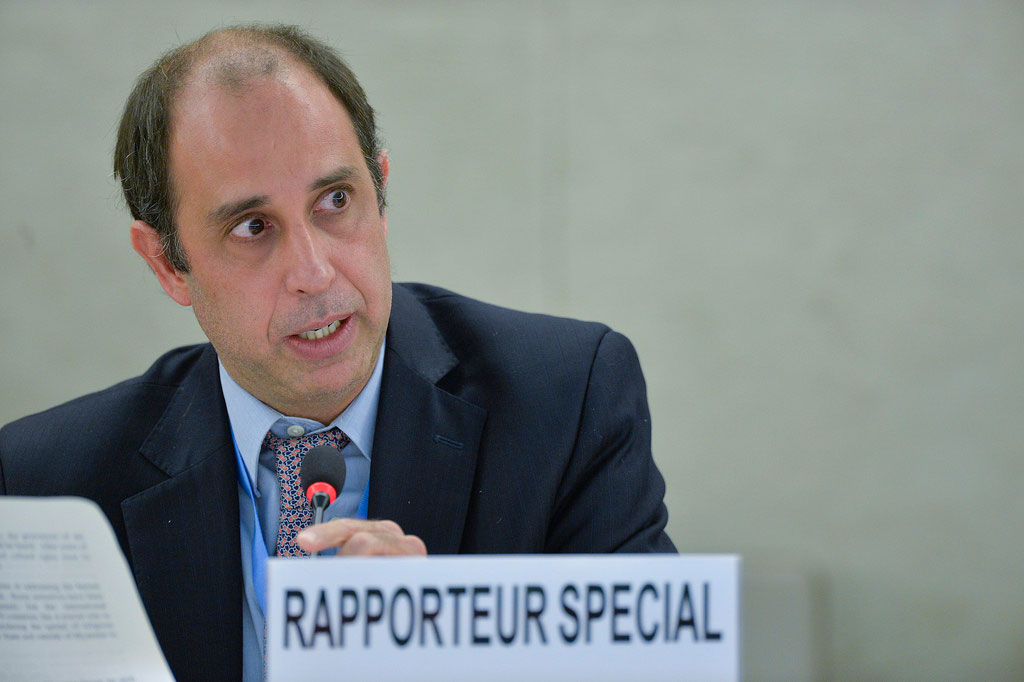December 26, 2025 06:12 am (IST)

Myanmar: UN alarmed at worsening human rights situation
New York, Apr 8 (IBNS): An independent United Nations expert on Monday sounded the alarm on the deteriorating human rights situation in Myanmar's Rakhine state, adding that the evacuation of aid workers following recent attacks on the humanitarian community would have severe consequences for life-saving work in the area.
“Recent developments in Rakhine state are the latest in a long history of discrimination and persecution against the Rohingya community which could amount to crimes against humanity,” said the Special Rapporteur on the human rights situation in Myanmar, Tomás Ojea Quintana.
He warned in a news release that the evacuation of aid workers, following the recent attacks on UN and non-governmental organization (NGO) premises in the state capital, Sittwe, “will only increase the vulnerability of this community.”
“These workers were in Rakhine state providing essential life-saving support, including health services, water and food to internally displaced persons, isolated villages, and other affected communities,” he noted. “The withdrawal of these workers will have severe consequences on the enjoyment of fundamental human rights, including the right to life.”
He warned that the availability of water could reach critical levels within a week in some displacement camps, particularly in Pauktaw. The impact on healthcare will be particularly severe for the 140,000 people still in such camps in Rakhine and the 700,000 vulnerable people outside the camps.
Ojea Quintana noted the Government’s commitment last week to ensure the safety and protection of UN and NGO personnel, and underlined the need for the prompt return of all humanitarian staff so that their life-saving work can resume with all communities.
Prior to these latest developments, the Special Rapporteur had reported to the UN Human Rights Council in March that, taking into consideration the information and allegations he had received throughout his six years on the mandate, crimes against humanity may have been committed in Rakhine.
He also expressed concern about the ongoing census in Myanmar. “The Government’s decision against self-identification of the Rohingya for the census is not in compliance with international human rights standards,” he stressed.
Self-identification for the Rohingya has been at the root of some protests in the past in Rakhine that led to violence and human rights violations and abuses for which there is yet to be accountability. “The ongoing census risks this cycle repeating itself,” the expert said.
“Self-identification should constitute a pillar of the collection of ethnically disaggregated data. It is related to respect for the rights of individuals to assert their own identity,” Ojea Quintana stated. “To deny self-identification is therefore a violation of human rights.”
During his latest mission to the country last February, the expert heard from various ethnic groups that the ethnic categories included in the census did not reflect how they identified themselves.
“It is not only in Rakhine state that people object to the ethnic categories included in the census,” he noted. “It became clear during my discussions with communities in Kachin state that the Government has approached the census without sufficient or meaningful consultation with all affected communities.”
The news release noted that Ojea Quintana’s views on the census and calls for the prompt return of all humanitarian staff are shared by the Special Rapporteur on the human rights of internally displaced persons, Chaloka Beyani; the Special Rapporteur on minority issues, Rita Izsák; and the Special Rapporteur on the right of everyone to the enjoyment of the highest attainable standard of physical and mental health, Anand Grover.
The Special Rapporteur on the rights to freedom of peaceful assembly and of association, Maina Kiai, and the Special Rapporteur on contemporary forms of racism, racial discrimination, xenophobia and related intolerance, Mutuma Ruteere, also shared his views.
Independent experts or special rapporteurs are appointed by the Geneva-based Human Rights Council to examine and report back on a country situation or a specific human rights theme. The positions are honorary and the experts are not UN staff, nor are they paid for their work.
(Special Rapporteur on the situation of human rights in Myanmar Tomás Ojea Quintana. UN Photo/Jean-Marc Ferré)
Support Our Journalism
We cannot do without you.. your contribution supports unbiased journalism
IBNS is not driven by any ism- not wokeism, not racism, not skewed secularism, not hyper right-wing or left liberal ideals, nor by any hardline religious beliefs or hyper nationalism. We want to serve you good old objective news, as they are. We do not judge or preach. We let people decide for themselves. We only try to present factual and well-sourced news.
Support objective journalism for a small contribution.
Latest Headlines
Sheikh Hasina accuses Yunus regime of ‘unspeakable torture’ of minorities in Christmas address
Thu, Dec 25 2025
Bangladesh violence: Second Hindu man's lynching in days sparks fresh fears over minority safety
Thu, Dec 25 2025
Tarique Rahman returns after 17 years: Why Khaleda Zia’s son’s homecoming could reshape Bangladesh’s turbulent politics
Thu, Dec 25 2025
Chaos in Dhaka: Man dies after crude explosive hurled from flyover in Mogbazar area
Wed, Dec 24 2025
Bangladesh political turmoil: Osman Hadi’s brother accuses Yunus govt, alleges killing aimed at stopping elections
Wed, Dec 24 2025







